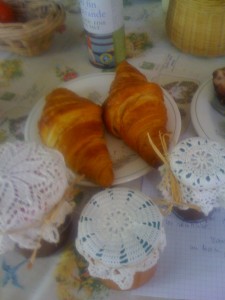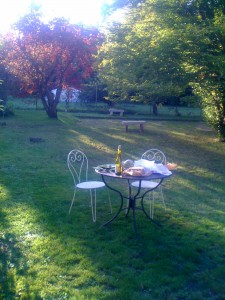Vive la France!

“I cannot write too much upon how necessary it is to be completely conservative that is particularly traditional in order to be free. And so France is and was.” (Paris France)
It is true, Stein was politically conservative, even at times reactionary, and this is part of the paradox of Gertrude Stein. The language revolutionary came from a proudly bourgeois, assimilated Jewish family with a great admiration for Washington and Grant. Clearly Stein felt you had to be rooted in solid ground in order to go out to the edge and not fall down. I never paid much attention to this wide-spread modernist paradox; it seemed irrelevant next to Stein’s monumental oeuvre of some 600 titles containing lots of poetry and little or no politics. I paid attention to the fact that from 1943 onward, Stein rooted for the Resistance, and to the fact that she had always expressed her profound dislike of Germany and Hitler, “There is too much fathering going on just now and there is no doubt about it fathers are depressing. “ (Everybody’s Autobiography, 1936), and she had made brilliant statements about the difference between Germany and France: “The characteristic art product of a country is the pulse of the country, France did produce better hats and fashions than ever these last two years and is therefore very alive and Germany’s music and musicians have been dead and gone these last two years and so Germany is dead well we will see, it is so, of course as all these things are necessarily true.” (Paris France, 1939)

How could anyone loving France not want to stay in France, I asked myself, even (and maybe especially) when France was in grave danger? Just last September, when I was in Paris and spent a good week at the Loire, it was a shock to be reminded how wonderful France, life in France, really is. No matter that I had lived in Paris for almost 20 years and visited often, I had forgotten! Here, around San Francisco where you get the best food in America, the best coffee, best croissants, French cheeses and wines, I almost believed that the “Global Village” had succeded and obliterated the need to travel to France.
But then there I was, and there was the real thing again, and I can tell you there is nothing like it. Nothing you eat here tastes anything like a baguette, a croissant, a round of goat cheese, a glass of Loire wine, a fresh walnut from the Dordogne, big as a lime, tastes over there. You have to go half around the world to realize that French coffee, excellent in even the smallest bistro anywhere in the countryside, is a world apart. That French butter has almost nothing in common with what we can buy here as “European-style” butter. I could go on…
This and the beauty of the old villages, the way the sandstone catches the light throughout the day – I kept wondering and wondering how anyone could question Stein’s decision. She had grown up on 10 acres of Californian land, a tomboy, with goats and chicken and apple trees, and in her French village, where she and Alice spent every summer, she was rooted like an old tree by the time the war arrived. She loved her country neighbors, and they told her to stay: they would care for her and Alice. They would protect them.
 The suspicious questioning of how Stein and Toklas were able to survive the war as Jews reveals a considerable ignorance of the conditions in Vichy and Occupied France and a troubled confusion of France with Germany. In Germany, half of the German Jews were trapped after 1938, and almost every one of them was murdered. In France, three quarters of the Jewish population survived in the same way Stein and Toklas did, with the help of friends and neighbors, and often even with the help of French officials who quietly ignored German orders. Not that it was easy or safe. Any day, they could have been denounced. Should they flee to near-by Switzerland – without legal papers, as they were advised – into the complete unknown? Without being able to take their beloved dogs?
The suspicious questioning of how Stein and Toklas were able to survive the war as Jews reveals a considerable ignorance of the conditions in Vichy and Occupied France and a troubled confusion of France with Germany. In Germany, half of the German Jews were trapped after 1938, and almost every one of them was murdered. In France, three quarters of the Jewish population survived in the same way Stein and Toklas did, with the help of friends and neighbors, and often even with the help of French officials who quietly ignored German orders. Not that it was easy or safe. Any day, they could have been denounced. Should they flee to near-by Switzerland – without legal papers, as they were advised – into the complete unknown? Without being able to take their beloved dogs?
In 1939, they had made a mad dash to Paris to take a few things back to their country house, among them just two paintings from their vast collection: Picasso’s portrait of Stein and the Cézanne’s Portrait of Mme Cézanne. They didn’t find their passports, but they found the pedigree papers for Basket, their big poodle. This turned out to be a blessing as the Germans — with their racial obsessions — accorded special food rates to pure-bred dogs. No, they wouldn’t leave their dogs behind for a questionable safety for themselves. They would hold out and muddle through, all of them together, with their peasant neighbors and friends, a vegetable garden, with Alice’s kitchen artistry and Gertrude’s Black Market skills. Five years is a long time of deprivation. At some point, when all of France was occupied and all ties to America were cut, they had no source of money for an entire 6 months. Again, a friend and neighbor helped them out. But they ended up having to sell and “eat the Cézanne.” They had no heating and the language revolutionary who used to claim, “It takes a lot of time to be a genius. You have to sit around so much doing nothing,” would cut wood all day, walk miles and miles for an egg or a bit of flour, and weed her garden.
The two elderly Americans (even Alice turned 65 during the war) were not noticed by the Germans – only Basket was. He was admired – which reminds me: A new little calendar book has come out: Everyday Dogs: A Perpetual Calendar for Birthdays & Other Notable Dates, from Heyday Books in Berkeley. Of course, there is Gertrude, late in her life, holding a very furry Basket on her lap. You will see it by turning to the third week of January 2012.




